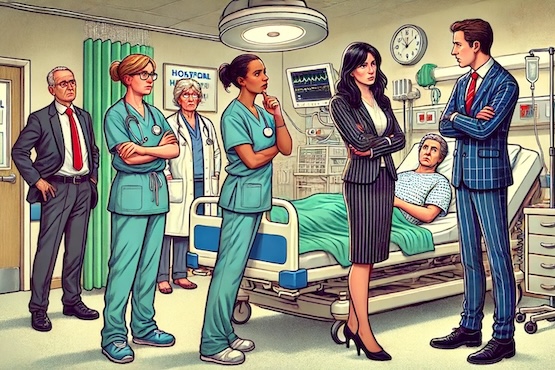Therapy services facing workforce crisis

Mental health therapy services in the UK could collapse within a decade without urgent action to boost recruitment and improve working conditions for mental health staff, according to new academic research.
A survey of 1,500 mental health workers by the Surviving Work website, in association with the Tavistock and Portman NHS Trust, found that 21% of therapists were working in unpaid jobs and more than half had to take on more than one job to make ends meet.
The findings present “a bleak prognosis for earning a living as a therapist in the UK” said Dr Elizabeth Cotton, founder of Surviving Work and a specialist in workplace mental health at Middlesex University, who led the research. “Job insecurity is a major theme with many therapists on precarious contracts, and a rapid rise in self-employment,” she added.
Unpaid working
Unpaid therapy work was now widespread across the NHS and the not-for-profit sector, Cotton explained. “If trained professional therapists cannot earn a decent living, when the current 21% of psychotherapists who are 57 years or older retire, who will provide services for the one in four of us who experience mental health problems?” she said.
Mental health workers taking part in the survey said that only 25% of concerns about patient safety were resolved by employers, a figure that falls to 8% for complaints about poor working conditions.
Cotton warned that the ageing workforce, poor pay and working conditions, and the lack of promotion opportunities for senior professionals mean “the sector will over the next ten years face a crisis of developing experienced and qualified therapists to manage the mental health crisis in the UK”.
Current system “unsustainable”
The research, which was supported by several trade unions including the RCN and UNISON, included in-depth interviews with 68 mental health professionals. They revealed widespread concerns that the current mental health system is unsustainable.
“It’s a bad time to have a mental health problem as well as working in it. It’s the worst I’ve ever known. It’s just not sustainable emotionally for people,” said one senior therapist.
“There is a lot of staff sickness absence, everywhere I look I see burnt out therapists, trying to survive, waiting and praying for change,” added another.
|
Agenda for Change, introduced 20 years ago, was supposed to put an end to inconsistency and unfairness in how NHS staff are paid. But staff shortages and tight budgets mean many staff are now graded below the level of the work they’re doing. It’s time to modernise the system, says Rhys McKenzie.
07 October 2024
| By Rhys McKenzie
Feature
|
|||||
|
Special Report: People in public-facing jobs are being confronted by more violence and abuse at work, and the NHS is at the sharp end. Existing policies are failing – we need a more co-ordinated and energetic approach to tackle the root causes and protect the staff who care for others.
18 September 2024
| By Craig Ryan
Feature
|
|||||
|
Reflecting on our own assumptions and behaviour is the first step towards inclusive leadership, writes Ramima Khanam. By putting ourselves in other people’s shoes and learning from conversations we can help to create more inclusive and productive workplaces.
18 July 2024
| By Ramima Khanam
Feature
|
|||||
|
ELECTION 2024:We look at four looming trouble spots you won’t hear much about in the campaign.
21 June 2024
| By Craig Ryan
Feature
|
|||||
|
ELECTION 2024:We look at what the experts say about six key challenges facing the NHS: waiting lists, workforce, social care, reform, buildings and technology. Do Labour or the Conservatives have the policies to meet them?
18 June 2024
| By Rhys McKenzie & Craig Ryan
Feature
|
|||||
|
ELECTION 2024:As polling day nears, Jon Restell and Rhys McKenzie set out MiP’s agenda for the next government: supporting the workforce, stabilising the health and care system, boosting productivity and giving managers freedom to do their jobs.
17 June 2024
| By Rhys McKenzie & Jon Restell
Feature
|
|||||
|
Under pressure from political demands and relentless organisational change, many board-level NHS managers are feeling the effects of burnout and contemplating leaving the NHS, according to MiP’s ’Sounding Board’ of senior members and the union’s evidence to the pay review body.
22 April 2024
| By Rhys McKenzie
Feature
|
|||||
|
Thinly-staffed NHS mental health services are under intense pressure, with patients facing interminable waits for diagnosis and treatment. Could artificial intelligence and chatbots be part of the answer? What are the risks and what does this largely-unregulated new technology mean for patients and staff?
17 April 2024
| By Craig Ryan
Feature
|
|||||
|
Joining the Scottish health department weeks before the pandemic struck, Caroline Lamb found herself head of NHS Scotland within a year. She talks about the “intense and scary” experience of managing through the Covid crisis, her plans to integrate services and tackle staff shortages and why Scotland needs more money for health and care.
12 April 2024
| By Matt Ross
Interview
|
|||||
|
With constant upheaval in the health service, new mothers working for the NHS are often anxious about going back to work. Jo Seery explains the rights women have when returning after maternity leave.
30 January 2024
| By Jo Seery
Legal Eye
|
|||||
|
Related News
-

MiP responds to the abolition of NHS England
Government risk repeating same mistakes as Lansley by abolishing NHS England and cutting more staff from ICBs, says MiP.
-

NHS England and central staff could be cut by 50%, NHSE has announced
Government planned cuts at NHS England go much further than previously announced, with up to 50% of staff at risk.
-

New MiP survey shows growing support for principle of regulating managers, but warns it won’t improve patient safety
MiP’s member survey on regulating NHS managers shows managers are still not convinced regulation will improve patient safety or raise standards, despite growing support for it in principle.









